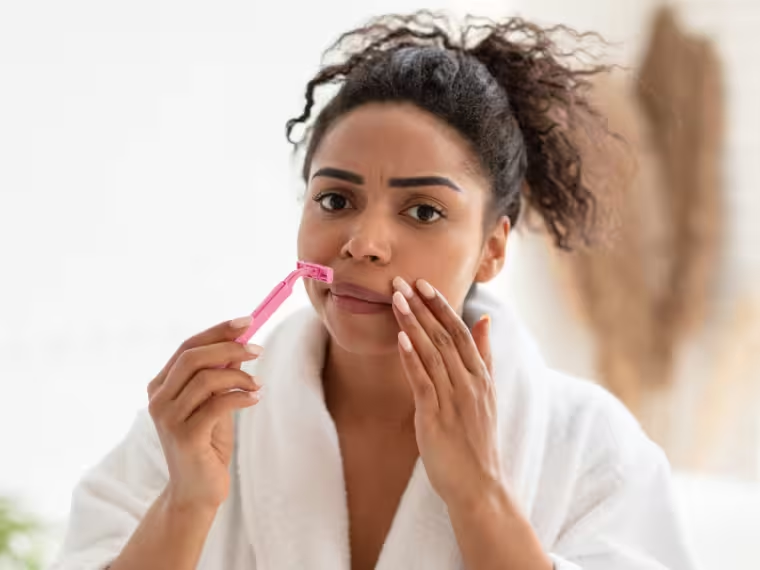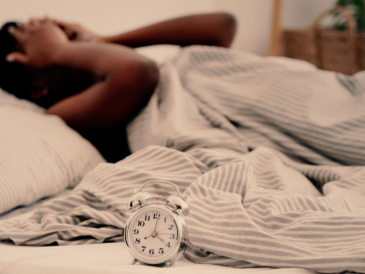There’s nothing more frustrating than having to triple check your cheeks or chin for long, thick strings of hair. I know this all too well. I’ve been plucking at it for years. Not only that, but I also noticed that it seemed to be getting worse with time, which makes it even more frustrating. After spotting a TikTok reel saying Cyperus Oil or Spearmint Oil would fix it all, I got curious. Is an essential oil really the solution? It’s clear that many of us ladies experience this excess facial hair, especially as we get older. But after much digging, it turns out to be a lot more than just a cosmetic concern—it’s often linked to hormonal imbalances or other underlying conditions. And as a science-based nerd, I know you can’t fix a problem with just medicating as a solution. You need to get to the root of it to make it go away. So this is the breakdown of why so many women develop facial hair and ways to get rid of it.
The Hormonal Scoop: the Root Cause of Facial Hair in Women?
One of the most common reasons women experience unwanted facial hair is due to elevated androgen levels. Androgens are “male hormones,” but women also produce them in smaller amounts. When these hormones rise or when the body becomes more sensitive to them, it can result in facial hair growth in women—on the chin, upper lip, and sometimes even on the cheeks.
1. PCOS (Polycystic Ovary Syndrome)
PCOS is a major cause of excess facial hair in women and impacts up to 85% of those dealing with this issue. PCOS disrupts hormonal balance, leading to higher androgen levels, which cause hair growth in all of those unwanted areas. Along with facial hair, you may notice irregular or painful periods, weight gain, and sometimes acne or thinning scalp hair. That last one is my biggest enemy, for sure.
2. Other Hormonal Conditions
- Cushing’s Syndrome: Elevated cortisol levels, the stress-hormone, can cause an increase in androgens, which can lead to the development of facial hair in women.
- Congenital Adrenal Hyperplasia: A genetic condition where the adrenal glands produce too many androgens.
- Ovarian or Adrenal Tumors: Rarely, tumors in these glands cause an overproduction of androgens, leading to unwanted hair. This one sounds more dramatic, and although possible, it is less likely that this is the cause as it will come with a load of other symptoms.
3. Genetics and Ethnicity
Your genetic background may play an unwanted lead character role in your facial fuzz. If women in your family have dealt with excess facial hair, there’s a good chance you will too. Women of Mediterranean, South Asian, or Middle Eastern descent are more prone to this, as they naturally produce higher androgen levels. I’m mixed with Mediterranean roots. And when I remember my mother, I do recognize some resemblance.
4. Medications
Your meds might be elevating androgens in the body, leading to unwanted facial hair. Double-check the side effects list for some of the medications you are taking. That includes anabolic steroids, testosterone supplements, and even some hair growth treatments like minoxidil or using castor oil.
5. Lifestyle Factors
- Weight and Insulin Resistance: Excess weight and insulin resistance can contribute to higher androgen levels. Women with insulin resistance (often tied to PCOS) are especially susceptible to this.
- Menopause: As estrogen levels drop during menopause, androgens can take over, leading to facial hair in menopausal women.
6. Idiopathic Hirsutism
Sometimes there’s no clear medical cause for hirsutism (the technical term for excess hair growth in women), and doctors call this idiopathic hirsutism. Your body might just be more sensitive to androgens, even if levels are normal.
How to Remove Unwanted Facial Hair and Address the Underlying Issue
Knowing why you’re dealing with facial hair as a woman is the first step; now, let’s dive into how to get rid of it.
1. Medical Treatments for Facial Hair
- Birth Control Pills: These can help regulate hormone levels and lower androgens, reducing facial hair growth over time.
- Anti-Androgens (like Spironolactone): This medication blocks androgens, reducing unwanted hair growth. It’s commonly prescribed for women with PCOS.
- Topical Creams (like Vaniqa): Applied to the face, this cream slows down hair growth rather than removing it. Over time, you’ll notice less regrowth.
2. Lifestyle Changes
- Weight Loss: For women who are overweight, shedding some pounds can help lower androgen levels and improve insulin sensitivity.
- Exercise: Regular physical activity, especially strength training, can help balance hormones and improve insulin sensitivity.
- Diet Adjustments: A diet rich in omega-3 fatty acids, spearmint tea (known to lower testosterone), and flaxseeds may help reduce androgens. Furthermore, consider a low glycemic index diet to improve insulin resistance.
3. Facial Hair Removal Methods
If you want to remove the hair while addressing the underlying issue, here are some effective options:
- Laser Hair Removal: A popular, semi-permanent option that targets the hair follicle to reduce future growth.
- Electrolysis: A permanent solution where a tiny electric current is used to destroy hair follicles.
- Waxing, Threading, or Shaving: These provide immediate but temporary relief from unwanted facial hair.
- Depilatory Creams: Hair removal creams dissolve hair at the skin’s surface. Be careful with sensitive facial areas.
4. Natural Remedies for Facial Hair
For those seeking a more natural approach to facial hair removal, there are some options:
- Spearmint Tea: Studies suggest that drinking two cups of spearmint tea a day can reduce testosterone levels.
- Soy Products: These contain phytoestrogens, which may help balance hormone levels.
- Saw Palmetto and Licorice Root: These herbs may reduce androgen levels, though more research is needed to confirm their effectiveness.
5. Supplements for Hormonal Balance
- Inositol: A supplement that helps improve insulin sensitivity, which can be beneficial for women with PCOS who are dealing with facial hair.
- Vitamin D: Many women with hormonal imbalances have low levels of vitamin D, so supplementing can help regulate your hormones
- Berberine: For women with PCOS or insulin resistance, berberine could help improve insulin sensitivity. It’s been shown to lower blood sugar levels and reduce insulin resistance, which can, in turn, help manage androgen levels and reduce unwanted facial hair. Berberine has similar effects to metformin, a common medication for insulin resistance, but with fewer side effects. It can also aid in weight loss, which further helps in balancing hormones. Be careful though! Berberine can interact with medications, particularly Type 2 Diabetes related ones. If you take prescription medication, it’s best to speak to a GP.
What About Carthamus Oil and Cyperus Oil?
These oils are gaining attention for their potential to slow hair growth:
- Carthamus Oil (Safflower Oil): This oil is rich in linoleic acid and may help balance hormones, though there’s limited research on its direct effect on facial hair.
- Cyperus Oil: Some small studies suggest that cyperus oil can reduce hair growth when applied regularly. It also contains anti-inflammatory benefits that may soothe skin.
The Bottom Line
Dealing with facial hair can be extremely frustrating, but it’s something you can manage once you understand the root cause. Whether it’s PCOS, hormonal imbalance, or genetics, there are several treatments and removal methods to explore. Don’t hesitate to talk to your doctor about your options and what works best for you!





